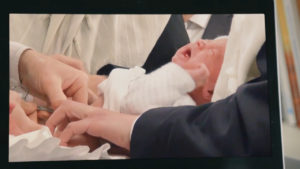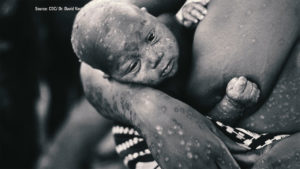Metzitza b’Peh – Keystone of Judaism
Whether born in your household or bought with your money, they must be circumcised. My covenant in your flesh is to be an everlasting covenant.
(Genesis 17:9)
In the Bible, non-circumcision is punishable by death for the infant; if up to 90% of the community remained uncircumcised, the penalty was the destruction of the entire community[2] with no exceptions[3]; including up to the 10% who observed the law all would be killed[4].
The Jewish practice of circumcising male children on the eighth day of life, the Shabbat laws, and the ritual prayers are claimed to be the three crucial links between God and the Jewish persons[1]. As the obligation to circumcise babies on the eighth day supersedes the obligation to refrain from work on the Sabbath, Jewish circumcision is the decisive hallmark of Judaism.
Blood must be sucked out with the mouth.
In the Babylonian Talmud, Rav Pappa (AD 300 – 375) says: “A mohel who does not perform metzitzah endangers the baby and is dismissed”[5]. The religious scholar Maimonides (AD 1235 – 1304) explained that the flow of blood is decisive for eliminating the danger mentioned by Rav Pappa: “And then (after removing the foreskin) one sucks the circumcision until blood in the further reaches is extracted, so that (the infant) will not be endangered, and any mohel who does not perform metzitzah shall be dismissed”[6]. Lord Immanuel Jakobovits, Chief Rabbi of the British Commonwealth, reiterated this statement in 1959 and has yet to be contradicted: “… and any circumciser who does not carry out the sucking procedure is to be removed from his office”[7].
Watch the video “Metzitza b’Peh part one – Keystone of Judaism”
Watch the video “Metzitza b’Peh part two – Mechanisms, immediate and long-term consequences, and the purpose”






Notes:
[1]Neumann D. Bund und Bekenntnis. Jüdische Allgemeine, March 24, 2011:8
[2] Destruction of Sodom
[3] Genesis 17:7-14
[4] Genesis 18:20-33
[5] Talmud, Shabbat 133b
[6] Talmud, Shulchan Aruch, 14, 264, 3 cited in Dr. Halperin 2006.
[7] Jakobovits I. Jewish Medical Ethics: A Comparative and Historical Study of the Jewish Religious Attitude to Medicine and its Practice. New York, 1959:193-94